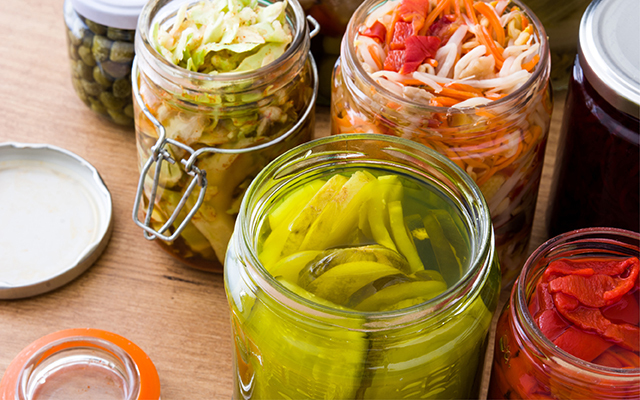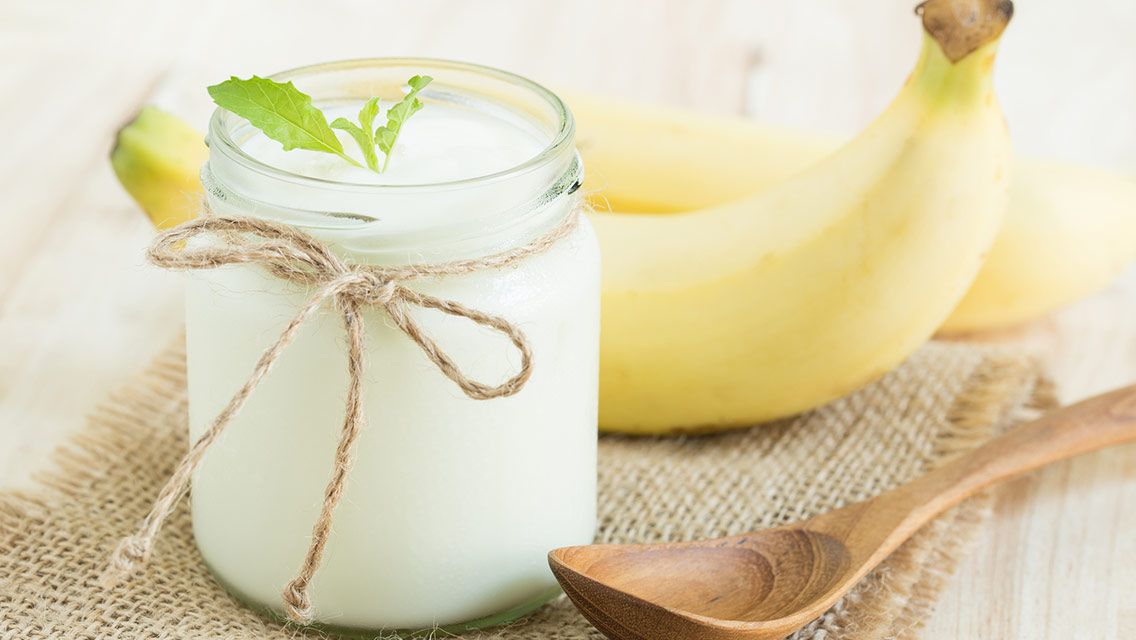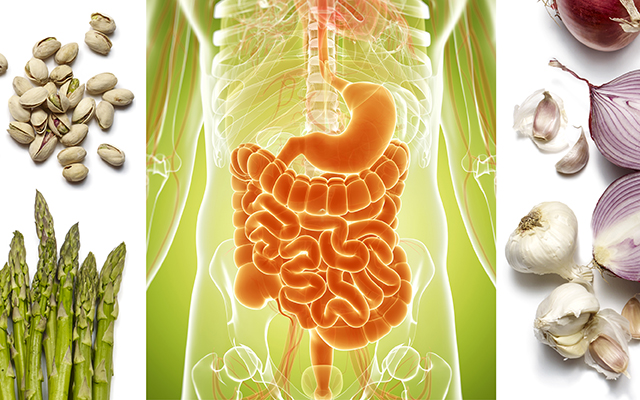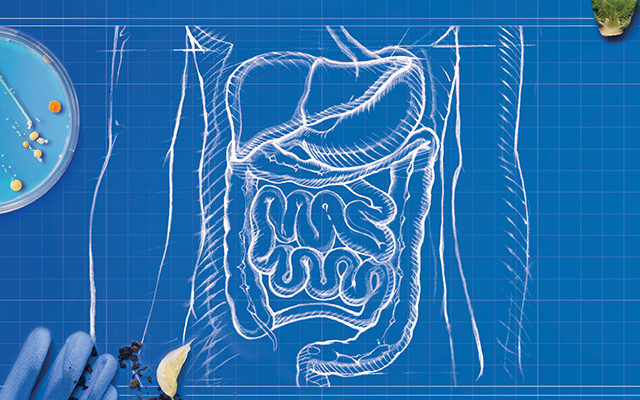Eager to balance your gut and improve your immunity but overwhelmed by the options? Here are some tips.
1. Seek out fermented foods.
Fermentation concentrates plants’ nutrients, especially B and C vitamins, and inoculates the gut with a host of beneficial bugs. The list of food options is long: yogurt, miso, tamari, sourdough bread, and kombucha, for example, are all fermented foods that naturally contain probiotics. “Sauerkraut is one of the cheapest probiotics you can buy,” says Atlanta-based nutritionist and naturopath Deirdre Rawlings, PhD, ND, author of Fermented Foods for Health: Use the Power of Probiotic Foods to Improve Your Digestion, Strengthen Your Immunity and Prevent Illness. Whenever possible, buy natural sauerkraut fermented in saltwater because foods preserved in vinegar (an astringent) can disturb the gut’s natural acid levels.
2. Be selective when choosing probiotic-enriched foods.
Only fermented foods naturally contain probiotics, but food manufacturers have jumped on the bandwagon, sprinkling the beneficial bugs into a wide range of foods, like cereals, snack bars, and bread. When probiotic cultures are separated from their original source and added to processed foods, however, their benefits may not transfer. Extreme temperatures are enough to kill many healthy bugs, so the advantages of probiotics added to baked goods and ice cream are questionable, says W. Allan Walker, MD, director of the division of nutrition at Harvard Medical School. “In many cases, the public is being hoodwinked by food makers who are eager to capitalize on people’s desire to eat healthily.”
3. Buy and store probiotic-rich foods in glass jars or ceramic containers.
Avoid metal tins because they often contain aluminum, which can interact with the lactic acid in fermented foods and potentially create toxins, says Rawlings. And scratched or soft plastics may leach chemicals into your food.
4. Chill for longevity.
When refrigerated after opening, some fermented foods will keep for several weeks. Beneficial bacteria will multiply as long as the container is not contaminated (so never eat directly from the jar or double-dip). Live supplements will survive for months in the refrigerator; freeze-dried, even longer. Warning: If left unrefrigerated, certain probiotic-rich foods and drinks (like kombucha) can spoil, build up pressure, and even explode their packaging.
5. Analyze your food and supplement choices.
If you are targeting a specific health challenge, such as digestive problems, you might opt for the probiotic supplements route. If so, be aware that the benefits of probiotics vary from strain to strain. For example, the strain that combats irritable bowel syndrome is different from the strain that prevents urinary tract infections. It’s a good idea to consult the supplement manufacturer about any supporting research, says Mary Ellen Sanders, PhD, an industry consultant who serves as executive director of the International Scientific Association for Probiotics and Prebiotics. But if your main goal is simply to improve your overall health, you might be better off buying high-quality, probiotic-rich foods rather than a supplement, because you’ll get lots of macro- and micronutrients as well as beneficial bacteria. You’ll probably also save yourself some money in the process.
6. Buy the best supplements you can afford.
When considering your supplement options, keep in mind that probiotics are sensitive to temperature, moisture, and oxygen — and the journey from factory floor to large intestine is a long one. Survival, and therefore efficacy, depends on how strains are cultivated, preserved, stored, and handled. This is not the time to pinch pennies. “You can’t buy a six-dollar bottle at a big-box store and expect results,” says Rawlings. “When it comes to probiotics, you pretty much get what you pay for.” Check company websites for links to published research, consult integrative health professionals about their favorite brands, and buy from companies you trust.
7. Consider quantity.
The number of live microorganisms in a probiotic is measured in CFUs (colony forming units). Any supplement label should list how many live microorganisms are in each serving. Recommended doses range from 1 billion CFUs (to maintain a healthy gut, for instance) to 10 billion CFUs (for addressing specific conditions). Ideally, swallow probiotics on a full stomach when stomach-acid levels are low to give probiotics their best chance at survival. Some experts counsel building up your levels of probiotics gradually to avoid any gas or bloating.
8. Increase your fiber intake.
In order for probiotics to do their job and flourish, they need a steady supply of fuel. That fuel comes in the form of a type of soluble fiber known as a prebiotic. The two most widely tested prebiotics have tongue-twister names: fructooligosaccharides (FOS for short) and galactooligosaccharides (or GOS). Ideally, you’ll take a combination of both prebiotics and probiotics. Together the duo contributes to a balanced gut ecosystem that can improve nutrient absorption and help move matter through the digestive system. The happier your ecosystem, the faster your metabolism, and the lower the odds of weight gain as you age, says Rawlings.
9. Minimize your exposure to environmental toxins, medications, and alcohol.
All three can damage the gut’s lining and can make it difficult for good bacteria to thrive.
10. Eat less junk.
Processed foods contain ingredients that irritate the gut and feed bad bacteria, making it harder for the good stuff to thrive. An occasional Happy Meal won’t do long-term damage, but ingesting processed foods like chips, cookies, and soft drinks every day can inflame the gut’s lining and create small fissures between cell walls. The result? Particles of undigested food slither through the cracks and are then targeted by a full-scale immune response, which makes things even more inflamed. Like vermin, bad bacteria multiply. Eventually the bad bacteria rule the roost, weakening stomach acid, which slows nutrient absorption, and concentrating bile, which prevents the necessary excretion of toxins and hormones (like estrogen). This, in turn, increases your risk of nutrient deficiencies and hormone-related cancers.
This originally appeared in “Probiotics at Work” in the March 2013 issue of Experience Life.




This Post Has 0 Comments